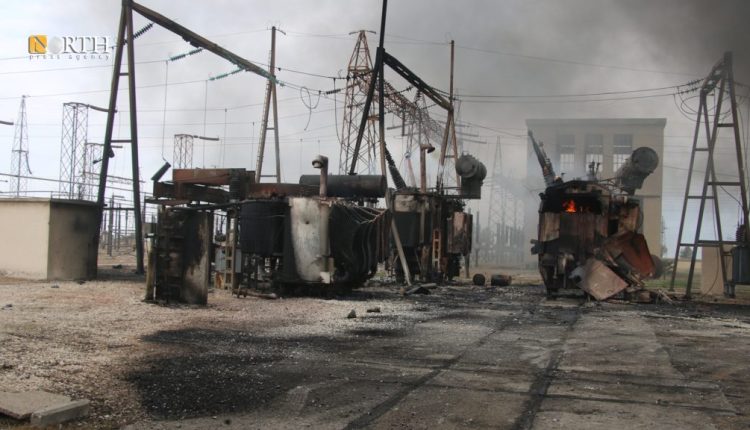
By Agid Meshmesh
QAMISHLI, Syria (North Press) – In Northeast Syria, efforts have been in full swing to address the impact of the recent Turkish airstrikes, which have left the whole region without energy resources. These airstrikes targeted power stations, substations, and oil and gas facilities.
The Energy Office of the Autonomous Administration of North and East Syria (AANES) works hard to restore electricity; however, it faces significant challenges that exceed its capabilities and resources, hindering the completion of maintenance work.
Turkey launched 122 airstrikes, including 62 drone strikes and 22 airstrikes by warplanes, targeting 89 sites in the region from the beginning of 2024 up to Jan. 15.
Turkish drones targeted the power plants in Kobani, Ain Issa, Amuda, Tirbe Spiyeh (al-Qahtaniya), Qamishli, and Derbasiyah. As a result, these stations went out of service, according to statistics released by the AANES on Jan.15.
Turkey also carried out seven airstrikes on oil facilities. The targeted locations included the Sweidiya gas plant, the Awda oil field, the Taflah Refinery station, and another oil facility in the village of Gire Pire, near the town of Tirbe Spiyeh. Furthermore, warehouses used for oil field maintenance in northeastern Syria were also hit.
These airstrikes caused a fuel shortage at the stations, a crisis in domestic gas supply with skyrocketing prices, water shortages lasting for days, and a complete power outage in Hasakah governorate, northeast Syria.
On Jan. 18, Abeer Khaled, Co-chair of the General Directorate of Fuel, affiliated with the Autonomous Administration of North and East Syria (AANES), told North Press that they are seeking to import the region’s energy needs, “but it will come at a high cost.”
She emphasized the urgent need for international support to repair the damage caused by the airstrikes and secure the needs of the population.
Complete electricity outage
Azad Suleiman, the head of the Energy Transmission and Distribution Department in Hasakah governorate told North Press that the airstrikes targeted all the electricity power stations that had previously been repaired after the Turkish airstrikes, confirming that they were “deliberately planned to deprive the region of electricity.”
He added that the Turkish airstrikes rendered 12 gas turbines, which were used for electricity generation at the Sweidiya plant, out of service and completely destroyed them.
Suleiman said that the Turkish strikes have caused complete electrical devastation in the region.
Following the airstrikes, the AANES announced the loss of electricity, water, gas, and the shutdown of hospitals and mills. Ahin Sweid, the Deputy Co-Chair of the Executive Council of the AANES stated that the region is facing extremely challenging living conditions due to the Turkish bombardment.
Suleiman further explained that ongoing maintenance works are being carried out at the Sweidiya power station to establish electricity supply from the Euphrates Dam in Raqqa, as the turbines at the Sweidiya station are completely destroyed.
The only source
The Euphrates Dam remains the sole source of electricity generation in northeast Syria; however, it is currently in a deteriorating and weakened state due to Turkey’s ongoing seizure of Euphrates water.
The AANES had previously warned about the Euphrates Dam potentially ceasing its operations altogether, emphasizing that it is currently operating at its lowest capacity.
Suleiman highlighted that they are unable to supply electricity to the cities in Hasakah governorate because the transformer stations in Derbasiyah, Qamishli, Tirbe Spiyeh, Derik, Kobani, and other areas have been destroyed, and they have no alternatives available.
The official concluded that the currently available electricity, after connecting the Euphrates Dam to the region, is only sufficient to support bakeries, mills, and hospitals in order to continue providing essential services to the area.
